Thursday, November 30, 2006
Trident issue Unlikely to Endear Clarke to Brown
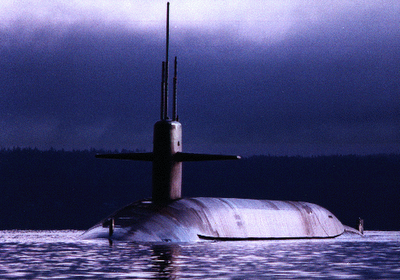 'At 56, will he be an energetic part of it?' Michael White asks today. The 'it' relates to Brown's putative coming administration and 'he' to Charles Clarke, Home Secretary until forced to stand down by Tony Blair over six months ago. White's article is located beneath one by Patrick Wintour on the former student leader's speech on defence to the Fabian Society.
'At 56, will he be an energetic part of it?' Michael White asks today. The 'it' relates to Brown's putative coming administration and 'he' to Charles Clarke, Home Secretary until forced to stand down by Tony Blair over six months ago. White's article is located beneath one by Patrick Wintour on the former student leader's speech on defence to the Fabian Society.In it he lambasts-correctly in my view- the policy of renewing Trident: 'a new weapon to fight an old war'. Blair has promised a three month debate about the issue followed by a Commons vote in the spring. Together with the costly new Tornado fighter, designed to shoot down Soviet aircraft over Central Europe, Trident represents yet another 'white elephant' piece of kit. Wintour identifies 'a genuine heavyweight voice' lacking since the death of Robin Cook, on the question of Trident's renewal. But will his voice have any effect? Clarke has been asiduously offering a portfolio of views in recent weeks, because, suggests White, 'he clearly wants Gordon Brown to give him a job'.
My guess would be that, able as Clarke obviously is, Brown will not make the offer. Firstly Gordon has already said, in a curious aside in his June Mansion House speech, that he favours renewal of the present deterrent. This alone, I would have thought would have ruled him out of contention as a relative maverick to a man who prizes loyalty above most things. Secondly, and conclusively in my view, Clarke launched an extraordinary and intemperate attack on his colleague last September as 'stupid, stupid stupid', as 'nervous and lacking confidence' and as 'uncollegiate'. Brown did appear to suggest in a later interview with Andrew Marr that Clarke might still be in the frame, but everything one hears about Brown's character- not least from Clarke himself- suggests he'll neither forgive or forget.
Wednesday, November 29, 2006
The Strength of the Weak
 Richard Nixon once famously said of winning the support of people that 'once you have them by the balls, their hearts and minds tend to follow shortly afterwards.' I'm fairly sure that this doctine- if it can be so described- is no longer operative, if it ever was. In terms of international history, imperial powers have conquered and stability followed. So Rome took over most of Europe and subject nations bowed their knees to the imperial banner. But there was always a consequence, the invariable fate of empires. Firstly the conquered absorbed the culture of their conquerors but not without a reciprocal effect taking place which wa soften just as significant. Secondly, the conquered, over time gestated their resentment marrried to an identity which was seldom lost, until the time came to make their own strike at the occupying power once, as invariably happened, its economic might began to decline. Thus have all empires been subverted from within and destroyed.
Richard Nixon once famously said of winning the support of people that 'once you have them by the balls, their hearts and minds tend to follow shortly afterwards.' I'm fairly sure that this doctine- if it can be so described- is no longer operative, if it ever was. In terms of international history, imperial powers have conquered and stability followed. So Rome took over most of Europe and subject nations bowed their knees to the imperial banner. But there was always a consequence, the invariable fate of empires. Firstly the conquered absorbed the culture of their conquerors but not without a reciprocal effect taking place which wa soften just as significant. Secondly, the conquered, over time gestated their resentment marrried to an identity which was seldom lost, until the time came to make their own strike at the occupying power once, as invariably happened, its economic might began to decline. Thus have all empires been subverted from within and destroyed. In the modern day a different chemistry is at work in the power relationships of modern states. Superpowers have believed, perhaps on thinking dating back to the second world war, that, while economic power wins influence, real power is acquired through the accumulation of superior armaments, or 'the barrel of a gun' as Mao put it. The Soviet Union discovered. to its chagrin, in the Hindu Kush, that this is not so; the Americans, in Vietnam, the same hard lesson. But somehow, the neo-cons advising Bush chose to forget/ignore these lessons and believed their big military stick would wield 'shock and awe' which would deliver Nixon's 'hearts and minds.'
But, the neo-cons seemed not to appreciate how fundamentally the world has changed since 1945. Superpower democracies maybe able to outspend the world several times over in defence terms but, in its execution, their power is grievously limited by two factors: their will to conquer is seldom as intense as their lightly armed enemies is to resist; and moreover, while such enemies can afford to bleed as much as they choose, a democracy is circumscribed by a polity which unsurprisingly takes exception to seeing the flower of its youth arriving home in bodybags. What power the superpower wields is therefore strictly limited and is operative usually only for a short time. For example, in the case of Iraq, US-UK had only a small window of time in which to win the battles and consolidate their conquest. They achieved the first but bungled the second and very soon the pendulum of advantage had swung away from the high-tech leviathan towards the militia men armed with AK 47s and an astonishing flair for savagery. That Nixonian equation was always suspect; now it is surely totally inoperative.
Tuesday, November 28, 2006
Can 'Fat Cats' be Curbed?
 I know it's too literal an image but my picture is intended to convey the sense of 'fat cats'(sorry, but I am a cat lover and I do have a fat(tish) cat myself). I was moved to address the subject by Dave Cameron's favourite columnist in her piece today. In lambasting the growing gap between boardroom and average staff pay-currently a ratio of 76:1- she draws on the recent work of Nick Isles of the Work Foundation. He has already exploded the myth that such highfliers will be spirited away overseas by the global market if any curbs on their greed are attempted:
I know it's too literal an image but my picture is intended to convey the sense of 'fat cats'(sorry, but I am a cat lover and I do have a fat(tish) cat myself). I was moved to address the subject by Dave Cameron's favourite columnist in her piece today. In lambasting the growing gap between boardroom and average staff pay-currently a ratio of 76:1- she draws on the recent work of Nick Isles of the Work Foundation. He has already exploded the myth that such highfliers will be spirited away overseas by the global market if any curbs on their greed are attempted:'our CEOs are mostly not only homegrown, but promoted from within their firms, and no global market clamours for their talent.'
He goes on in his latest research to rubbish the idea that these fat cats 'suffer more risk than others, either to their income, jobs, health or mental health', concluding with the recommendation that a High Pay Commission be set up to match the Low Pay Commission, 'to set suggested pay rates for the top'. The idea is that those companies which wildly exceed such norms would have some tough explaining to do to shareholders at AGMs.
The sentiment underlying such a proposal is impeccable from a left of centre standpoint- such inequalities are nothing short of obscene- but I'm dubious if any such HPC would have any real effect. Just as criminals always manage to stay a few steps ahead of the law, so do the rich find ways to keep accumulating more and more than they can possibly need. Any norms produced would end up as purely nominal as CEOs negotiated packages involving yet more additional bonuses, share options, medical care, vast pensions and the rest. Until shareholders are finally revolted by the salaries of their board members and resolve to take action, I fear repulsive 'fat cat' greed will continue to be a feature of our modern western societies.
Monday, November 27, 2006
Labour's Devolution Strategy in Danger of Unravelling?
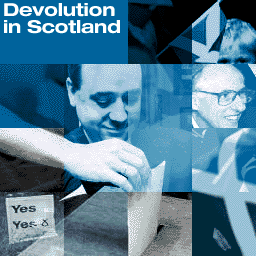 It must be a worry to Gordon Brown that his party's strategy for his home country is in danger of coming apart. Until the sixties home rule for Wales and Scotland was regarded as something of an eccentric diversion. But when MPs started to be elected for both Plaid Cymru and the SNP both main parties began to take notice. The Kilbrandon Report(1969-73) was the result. This considered independence and federalism but opted for devolution, initiating the tangled course taken to New Labour's implementation of this original vision shortly after 1997. But a major part of this vision was purely political. Labour felt that potentially nationalist Celts could be 'bought off' with a solution which provided a fair degree of autonomy backed up by legislative accountability.
It must be a worry to Gordon Brown that his party's strategy for his home country is in danger of coming apart. Until the sixties home rule for Wales and Scotland was regarded as something of an eccentric diversion. But when MPs started to be elected for both Plaid Cymru and the SNP both main parties began to take notice. The Kilbrandon Report(1969-73) was the result. This considered independence and federalism but opted for devolution, initiating the tangled course taken to New Labour's implementation of this original vision shortly after 1997. But a major part of this vision was purely political. Labour felt that potentially nationalist Celts could be 'bought off' with a solution which provided a fair degree of autonomy backed up by legislative accountability. After uncertain starts both the Scottish Parliament and the Welsh Assembly have become established if not warmly accepted by their respective countries. But the trouble with democracy is that eventually opposition parties tend to gather support and win elections. For years it seemed that neither national constituencies favoured independence and supporters of the union hoped it would become one of those formal shibboleths that meant little in practice, like Labour's Clause Four for example. When nationalist results seemed to indicate falling support at the last set of elections in 2003, some commentatotors concluded Labour's ploy of emasculating their appeal had succeeded. It had, but only for a while.
Recent polls show over half of Scots voters(52%) want independence and a real possibility exists of the SNP winning power in May 2007. What would they do next? It is unlikely they will sit on their hands and do nothing; we have to assume they mean what they say. A referendum would reveal how willing voters are north of the border to cast themselves adrift from England and Westminster and join the smaller nations of the EU. It would be a huge gamble for them as they currently receive a £10bn public spending surplus- courtesy of the ancient Barnett Formula- compared with England.
Unsurprisingly, this disproportionate distribution is one of the reasons why 59% of English voters also favour independence for Scotland. Yes, the unthinkable has become the thinkable and both Brown and Blair are seriously worried. They are right to be alarmed as England voted narrowly more Conservative than Labour at the last election. Scottish Labour seats are vital if Labour is to remain in power after 2009. Meawhile the Conservatives, lacking Scottish support and keener on exploiting English dissatisfactions with Scotland's extra handouts, are not too worried. Hence we saw Brown and Blair lashing out at the SNP at Labour's Oban conference over the weekend. Labour's smooth solution to the famously intractable devolution issue always seemed a bit too good to be true. Some critics said Labour had not thought it through properly; recent developments suggest those critics might have been right.
Labour's Devolution Strategy in Danger of Unravelling?
 It must be a worry to Gordon Brown that his party's strategy for his home country is in danger of coming apart. Until the sixties home rule for Wales and Scotland was regarded as something of an eccentric diversion. But when MPs started to be elected for both Plaid Cymru and the SNP both main parties began to take notice. The Kilbrandon Report(1969-73) was the result. This considered independence and federalism but opted for devolution, initiating the tangled course taken to New Labour's implementation of this original vision shortly after 1997. But a major part of this vision was purely political. Labour felt that potentially nationalist Celts could be 'bought off' with a solution which provided a fair degree of autonomy backed up by legislative accountability.
It must be a worry to Gordon Brown that his party's strategy for his home country is in danger of coming apart. Until the sixties home rule for Wales and Scotland was regarded as something of an eccentric diversion. But when MPs started to be elected for both Plaid Cymru and the SNP both main parties began to take notice. The Kilbrandon Report(1969-73) was the result. This considered independence and federalism but opted for devolution, initiating the tangled course taken to New Labour's implementation of this original vision shortly after 1997. But a major part of this vision was purely political. Labour felt that potentially nationalist Celts could be 'bought off' with a solution which provided a fair degree of autonomy backed up by legislative accountability. After uncertain starts both the Scottish Parliament and the Welsh Assembly have become established if not warmly accepted by their respective countries. But the trouble with democracy is that eventually opposition parties tend to gather support and win elections. For years it seemed that neither national constituencies favoured independence and supporters of the union hoped it would become one of those formal shibboleths that meant little in practice, like Labour's Clause Four for example. When nationalist results seemed to indicate falling support at the last set of elections in 2003, some commentatotors concluded Labour's ploy of emasculating their appeal had succeeded. It had, but only for a while.
Recent polls show over half of Scots voters(52%) want independence and a real possibility exists of the SNP winning power in May 2007. What would they do next? It is unlikely they will sit on their hands and do nothing; we have to assume they mean what they say. A referendum would reveal how willing voters are north of the border to cast themselves adrift from England and Westminster and join the smaller nations of the EU. It would be a huge gamble for them as they currently receive a £10bn public spending surplus- courtesy of the ancient Barnett Formula- compared with England.
Unsurprisingly, this disproportionate distribution is one of the reasons why 59% of English voters also favour independence for Scotland. Yes, the unthinkable has become the thinkable and both Brown and Blair are seriously worried. They are right to be alarmed as England voted narrowly more Conservative than Labour at the last election. Scottish Labour seats are vital if Labour is to remain in power after 2009. Meawhile the Conservatives, lacking Scottish support and keener on exploiting English dissatisfactions with Scotland's extra handouts, are not too worried. Hence we saw Brown and Blair lashing out at the SNP at Labour's Oban conference over the weekend. Labour's smooth solution to the famously intractable devolution issue always seemed a bit too good to be true. Some critics said Labour had not thought it through properly; recent developments suggest those critics might have been right.
Sunday, November 26, 2006
Is the Cameron Bubble Bursting?


'Hello', I thought, as I perused my Observer this morning, 'What's this tumbler sized draught of schadenfreude?' 'One year on and Cameron is Slipping' runs the strap line. Today's poll puts his party only two points up on the 05 election and Cameron's personal rating has 'plummeted lower than Tony Blair's'.
I recall the campaign of David Davis in last year's election(his chief of staff? none other than our very own uber blogger, Iain Dale) seeking to combat Dave's boyish charm with the line that after nine year's of Tony Blair the last thing the Tories needed was a 'Blairlite' substitute. Now the polls suggest Conservatives ignored the wisdom of that advice. Only 25% are 'satisfied' with Cameron's performance as Opposition leader; this rises to 45% among Tory voters but even this figure shows a fall from 60% last February.
All his predecessors since 1997 have tried to move the party to the centre but then, when stalwart party members threatened to desert, shuttled rapidly back into the comfort zone of Thatcherism. By the autumn of last year the Tories had realised this would not do- hence the Cameron landslide. But now it seems his lurches to the left, accompanied by much cheesy grinning and shots of his family, have not secured the lasting breakthrough which the polls initially signalled. Oh dear Dave. Too big a shift too quickly? Or have our cynical voters just not believed you? Perhaps you'd best peel off the mask and let loose the real Tory who lurks beneath? Maybe, eventually, like Haigh, IDS and Howard, you'll have no option.
Saturday, November 25, 2006
Dale's Ten things Not to Do

'The great blog chieftain himself Iain Dale has issued a challenge to me among other bloggers to name the top ten things I would never do - other than standing as a Tory candidate or posing in front of a Henry Moore statue, of course.'
So begins a recent post by fellow blogger, the excellent Paul Linford whereupon he provides his interesting list. It seems another part of Dale's splendid wheeze is that each member challenged should nominate another ten bloggers to do the same. Paul nominated me, as did Tiberious Grachus As I explain below, I have some trouble finding 10 names as so many of my regular commenters have already been mentioned either by Paul or by Gracchus. But anyway here is my list. It's offered only approximately in order of importance.
I would never:
10. Strike a woman
9. Visit a prostitute.... I appreciate fate or age or both might conceivably cause me to modify that one.
8. Accept that anyone was socially superior to myelf... I really abhor snobbery.
7. (Related to the above) Call Prince Charles 'Sir'... as he insists even his close friends address him.
6. 'Rediscover' religion... I am a confirmed member of the C of E but have long since abandoned genuine belief in any supernatural higher being.
5. Watch Stockport County again... once was enough.
4. Visit Disneyland again... here again, once was enough for several lifetimes.
3. Betray a close friend.
2. Have sex with a man.
1. Vote Tory.
As for new nominations, as I explain above, most of my regular contributors were 'snapped up' by Paul and old Tiberious but of those left I'd nominate: Mantex, Bob Piper, SPL, (if he can find the time in his desperate pursuit of pleasure at Oxford), my son Markus(if he can divert his mind from possible future thespian glories) and, if he is so inclined to comment, I'd be interested in the pet hates or taboos of my old sparring partner, Michael Oakeshott. Or indeed, any other friend or visitor who feels they'd like to offer a response to 'Dale's challenge'. I have used my blog to make my comments but lists can just as easily be left in the comment box.
Thursday, November 23, 2006
Polly Toynbee to Head Tory Commisison on Poverty?
 If someone had predicted, even five years ago that a Tory frontbencher would identify Polly Toynbee as a source of wisdom preferable to Winston Churchill, one would have discreetly called for the gentlemen in white coats. Polly has been unfairly demonised by the rightwing- their politicians, press not to mention leading bloggers- as the archetypal wishy-washy liberal- as the reason, in short, why no-one should bother reading The Guardian.
If someone had predicted, even five years ago that a Tory frontbencher would identify Polly Toynbee as a source of wisdom preferable to Winston Churchill, one would have discreetly called for the gentlemen in white coats. Polly has been unfairly demonised by the rightwing- their politicians, press not to mention leading bloggers- as the archetypal wishy-washy liberal- as the reason, in short, why no-one should bother reading The Guardian. As a devotee of this 'Bolshevik broadsheet', I have occasionally been irritated by her views but long ago-after reading her book on low pay based on working as a cleaner -decided always to read her far from wishy-washy articles. On poverty and low pay I have always thought her by far the best informed columnist and now, from the opposition, comes irrefutable confirmation. Her 'caravan in the desert' analogy, borrowed by Greg Clark, the above mentioned front bench spokesman, who has doubtless caused blood pressure amongst Telegraph readers to soar, is a good one. She reprises it today:
'All [in the caravan] may move forward, but how far behind do the poor at the back have to fall before they cease to be part of the same caravan at all?'
She calls for a more generous minimum wage. This is something which I strongly support since my son has been living with me after university, working in Manchester, seeking to save money to finance a year's study to become a professional actor. I can testify he is not living in the slightest bit extravagantly, yet, even though he pays no rent, he has saved nothing at all. How much more difficult is it for someone with a family to survive on the basic 'fiver plus a bit' per hour?
As Polly observes, it is Conservative acceptance of the notion of 'relative poverty' that is the real breakthrough; before that they tended to cling to Churchill's minimum 'safety net' standard. Polly reinforces the point:
'Poverty is measured internationally in relative terms, because that is how people feel it. To be poor is to fall behind what most ordinary people have in your society.'
And Greg Clark's advice to his leader does underline the one undeniable achievement of the legacy-hungry Blair: he has succeeded in extinguishing the remaining life in the head-banging school of thought initiated by Thatcher's 'no such thing as society' assertion. And long may it remain buried somewhere in one of the far from glorious chapters of the Conservative Party's history.
Wednesday, November 22, 2006
Why West-Islam Relations Seem a 'Clash of Civilizations'
 In my current affairs class today we discussed the clash between Islam and the west. Samuel P.Huntingdon's 'clash of civilizations' thesis has been much criticized but our conclusions seemed to bear out his analysis. We agreed that a Muslim country would resist the 'imposition' of democracy by the west- the prophet provides the ultimate authority; not, as the western Enlightenment laid down, the people- just as we would resist the imposition of Islam upon our own secular, liberal societies. Given this incompatibility, why don't we just agree to disagree and leave each other alone? Two reasons.
In my current affairs class today we discussed the clash between Islam and the west. Samuel P.Huntingdon's 'clash of civilizations' thesis has been much criticized but our conclusions seemed to bear out his analysis. We agreed that a Muslim country would resist the 'imposition' of democracy by the west- the prophet provides the ultimate authority; not, as the western Enlightenment laid down, the people- just as we would resist the imposition of Islam upon our own secular, liberal societies. Given this incompatibility, why don't we just agree to disagree and leave each other alone? Two reasons.Firstly Islam is an evangelising faith which seeks to convert 'infidels'. In its-arguably distorted- fundamentalist form it is also a vengeful ideology which seeks to destroy those- like us in the west- who have been recruited into the armies of 'The Great Satan'. Ahmadinejad (pictured) of Iran, claims he wants to 'wipe Israel off the map' and is not loath to repeat such threats. So even if we leave them alone, they will not return the compliment. And while the communists during the Cold War accepted 'peaceful coextistence', the latter strain of Islam uses the openness of the west to send or order its cohorts of suicidal fanatics to wreak havoc and murder.
Secondly, Islam entails practices which will never be acceptable to the West. Nowhere is this more the case than in its treatment of women. BBC Newsnight recently showed an inmate of an Afghan jail, Fatima, explaining how she went seeking a new family home. She went to see a housing agent who locked the door, said she been 'sent from God' and then raped her. When she reported it she was found guilty of adultery and imprisoned; the only way she could have been found innocent was for her attacker to confess or for four witnesses to the rape to come forward. When such desparate violations of human rights so regularly occur with impunity under Islam, the west will never view it as anything other than a cruel and alien creed which can never be tolerated let alone adopted. So, reluctantly, and not of our making, a 'clash of civilisations' it appears to be.
Monday, November 20, 2006
Politicians and that Greasy Pole

On becoming the first Jewish prime minister Benjamin Disraeli commented that he 'climbed to the top of the greasy pole', a striking image which has entered our culture as being synomous with political ambition. In the eponymous episode of Yes Minister, Humphrey asks Hacker why everything he does is related to climbing the greasy pole and he replies: 'I must climb the greasy pole because... because it's there.' The fact is, I suspect, that politicians themselves don't know why they are so driven to succeed; they just are that type of person. We all know them. They would be just as driven if they had become librarians, but have chosen or have drifted into politics.
Roy Hattersley recounts a revealing little anecdote about being recalled from holiday to deal with a crisis even though a junior minister could have done so. Wilson explained the parliamenary secretary 'was not up to it'. When Roy, surprised, asked why he had ben appointed in the first place, Wilson replied: 'We have to have one or two people like that so that other useless MPs can go on thinking they have a chance.' How many ministers can you think of who just might fit this description?
More to the point, I wonder whether the established vehicle of promotion- performance in the House- is necessarily relevant to performing well as a minister. Up to a presentational point, certainly, but does it develop adequately the other abilities a minister needs: to absorb masses of complex information rapidly; to know something about business; to be highly numerate; to draft clauses of bills accurately; to be a good manager of hundreds of employees; or to work as a team member?
In that Yes Minister episode, Hacker comments that his skill lies in interpreting what 'the great British public wants'. Humphrey remarks that the public is 'ignorant and misguided', to which Hacker replies that it was the same public who elected him. Quite. In the last analysis it's our responsibility, but do we really get the government we deserve?
Sunday, November 19, 2006
The Hidden Cost of Test Match Cricket
 Like one or two other political bloggers I occasionally post on sport. My main obsession under this head is cricket so I'm exercizing blogger's prerogative to comment on Mike Brearley's thoughtful article in today's Observer: cricketers and depression. Most fans of the summer game were concerned when Marcus Trescothick flew home from India with a mystery 'virus' which became even more mysterious when it morphed into a 'stress-related' illness. However, we were re-assured our ultra-reliable opener and ace first slip he would storm back to defend the Ashes so famously won in 2005. Yet his batting has never recovered and he has recently flown home from Australia, in some distress, with a recurrence of the same condition.
Like one or two other political bloggers I occasionally post on sport. My main obsession under this head is cricket so I'm exercizing blogger's prerogative to comment on Mike Brearley's thoughtful article in today's Observer: cricketers and depression. Most fans of the summer game were concerned when Marcus Trescothick flew home from India with a mystery 'virus' which became even more mysterious when it morphed into a 'stress-related' illness. However, we were re-assured our ultra-reliable opener and ace first slip he would storm back to defend the Ashes so famously won in 2005. Yet his batting has never recovered and he has recently flown home from Australia, in some distress, with a recurrence of the same condition. Most sports fans wonder at why Trez, an apparently rustically robust kind of guy who epitomizes the down to earth qualities of Somerset folk, should display symptoms so rarely associated with professional sportsmen whose nerves often seem so tempered by the rigours of their profession as to calmly sustain situations which akin to fighting in the front line of a real life war. Yet we are misled if we believe this. Brearley quotes the study by Davd Frith, Silence of the Heart which catalogues no less than 150 cricketers who committed suicide, the most surprising of which more recently, perhaps, being the extroverted Yorkshireman David Bairstow.
Brearley makes the point that county cricket can seem, as it did to Peter Roebuck, to resemble permanent 'trench warfare' and that, while it is a team game, the essence of it involves public individual confrontations, sometimes under the most demanding of pressures, for example that of Atherton against South African fast bowler Allan Donald in 1998. We, the supporters thrill to such epic clashes-and the sportsmen tell us time and again that this kind of pressure cooker tension is what they most relish about their calling- but maybe there is a cost we don't see or even wish to acknowledge.
Most cricketers end their lives after retirement, shorn of the validating triumphs and supportive collectivity in defeat, but Trescothick -he'll be 31 on Christamas Day- is some way off that. Personally I'm concerned, of course, that his absence will make us, all too legitimately, the underdogs when the action starts next Thursday and that lack of his experienced and calming presence will adversely influence the mood of the team when such qualities are most needed. As for him, I'm concerned that such a dramatic failing of a sportsman's natural confidence and combativeness will have prematurely ended an otherwise great sporting career.
Saturday, November 18, 2006
Blairism to Live on Courtesy of first French Woman President?
 Politics throws up all kinds of ironies. Look at Segolene Royal shrugging aside her older male socialist rivals to win the nomination to contest the French presidency against(almost certainly), Nicolas Sarkozy. She greatly admires Tony Blair we understand, so just as the long serving, deeply unpopular Blair gives way over here- a short distance away a new political force arises claiming allegiance to that same burnt out Blairism.
Politics throws up all kinds of ironies. Look at Segolene Royal shrugging aside her older male socialist rivals to win the nomination to contest the French presidency against(almost certainly), Nicolas Sarkozy. She greatly admires Tony Blair we understand, so just as the long serving, deeply unpopular Blair gives way over here- a short distance away a new political force arises claiming allegiance to that same burnt out Blairism.Royal offers herself as an outsider yet she is quintessentially in the tradition of French 'enarques', educated at the (even for Brits used to Oxbridge) astonishingly elitist Ecole Nationale (ENA), where she sipped coffee with the aristocratic, poetry writing prime minister, Dominique Villepin and met her future husband, Francois Hollande, who just happens to have made his way to the leadership of the French Socialist Party. She is also a rather beautiful 53 year old mother of four who caused flurries of gossipy interest this summer when pictures of her well preserved bikini clad figure appeared in popular magazines.
Chirac's 12 year reign has seen flagrant corruption, economic stagnation and relatively high unemployment- yet the Socialists must still cringe when recalling that their challenger at the last election in 2002 failed, at the first burdle and let in Jean-Marie Le Pen to eventually lose the contest against the wily Chirac. Royal is not understood to sympathize with Tony's Bushite overseas adventurism but does share his belief that the economy has to be made more competitive by embracing market forces more wholeheartedly. As a result she has criticised the sacred 35 hour week and received not a few brickbats from the unions in consequence.
Despite her feminine charm, Segolene has a reputation for being tough, possibly the result of her rebellious relationship with her ultra -Catholic army colonel father. On supporter from the right is quoted in The Guardian as welcoming the fact that she is 'authoritarian' as 'This country needs change and we need someone strong to do it.' If our experience of Blair's similar tendencies are anything to go by, the French might very well choose this attractive new force in their politics but might also live to rue the day a decade hence.
Friday, November 17, 2006
Milton Friedman Taught the Left as well as Informing the Right
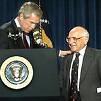

 I suppose I understand politics better than economics which has always confused me with its graphs with lines which intersect mysteriously(so I apologise in advance if my grasp of the subject is imperfect). However, I've always realised that economics is closely intertwined with politics and so have tried to understand it. I thought I had just about understood Keynes- for example that governments could stimulate the economy to beat recessions and manage it towards full emloyment- when along came Friedman in the sixties to offer a radical alternative. He rose to prominence during the seventies when inflation raged and government spending seemed only to stimulate more inflation rather than reduce unemployment.
I suppose I understand politics better than economics which has always confused me with its graphs with lines which intersect mysteriously(so I apologise in advance if my grasp of the subject is imperfect). However, I've always realised that economics is closely intertwined with politics and so have tried to understand it. I thought I had just about understood Keynes- for example that governments could stimulate the economy to beat recessions and manage it towards full emloyment- when along came Friedman in the sixties to offer a radical alternative. He rose to prominence during the seventies when inflation raged and government spending seemed only to stimulate more inflation rather than reduce unemployment.By advising the use of interest rates (as high as was necessary) to curb the amount of money circulating in the economy-the source of inflation according to his analysis-he was, to my left inclined seventies perceptions, causing bankruptcies and shrinking public expenditure. I was infuriated by this smug yet wholly calm and polite little Chicago economist who appeared on television in a series of programmes-I think called Free to Choose after his book- and wiped the floor with my then heroes including Dennis Healey and Neil Kinnock (I agree the latter was never in with a much of chance but I thought Healey would be). Shortly after that debate, I seem to recall, Healey began to implement a form of monetarism which squeezed the public sector, angered Labour MPs and probably cost him the leadership in November 1980.
Friedman's vision of monetary policy proved elusive for his Thatcherite disciples but his crystal clear reassertion of the idea that markets should be allowed to follow their own logic, relatively unhindered by government intervention, became orthodox not just in the Conservative Party but in the Labour opposition too, perhaps reaching its fulfillment for Labour in 1997 when Gordon Brown made the Bank of England independent. By setting interest rates at levels advised by economists and not politicians Brown has presided over a period of unprecedented economic growth. I'm not qualified to judge with any authority but I suspect Friedman-see his obituary here- must deserve at least a sliver or two of the credit.
Thursday, November 16, 2006
Will Local Government Promises in Queen's Speech be Fulfilled?
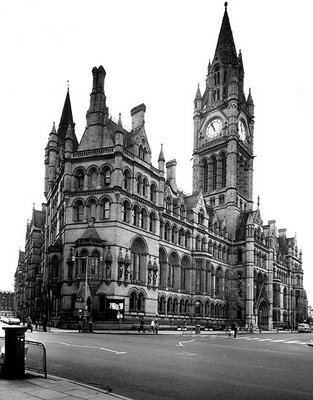 Simon Hoggart was right when he described the Queen seeming 'wearier than ever' as, at the centre of the pomp and boring ritual, she read out her prepared collection of new Labour cliches. Actually I felt more sorry for the poor old Duke of Edinburgh who twisted and fidgeted on his nearby seat like a schoolboy dying for the playtime bell. Michael White today looks back to the 1997 Queen's Speech and picks out those few promises which were fulfilled- Devolution, Independence for the Bank of England,'high and stable levels of economic growth' and those- education, NHS etc- where we are still waiting.
Simon Hoggart was right when he described the Queen seeming 'wearier than ever' as, at the centre of the pomp and boring ritual, she read out her prepared collection of new Labour cliches. Actually I felt more sorry for the poor old Duke of Edinburgh who twisted and fidgeted on his nearby seat like a schoolboy dying for the playtime bell. Michael White today looks back to the 1997 Queen's Speech and picks out those few promises which were fulfilled- Devolution, Independence for the Bank of England,'high and stable levels of economic growth' and those- education, NHS etc- where we are still waiting. Scanning the 30 or so proposed bills my eye alighted on the local government bit. Here we are promised, according to the Guardian: 'new powers for all levels of local government from parish councils to the mayor of London'. Parish councils will be given the freedom to 'create bylaws and impose instant fines'. I just wonder why I'm a bit cynical about promises to devolve more power down to the local government? Once Town and City Halls wielded the power which their splendid exteriors bespoke(see Manchester's pictured). But during the last century we saw councils stripped of functions, subjected to constant, disorientating reform and brought under the centralizing control of the Treasury to the extent that 80 percent of their finance now derives from general taxation and not the local council tax payer.
This means that in many areas local government acts merely as an agent for the centre and that room for local initiative is severely limited. It would seem that compared with much of Europe, we have an over centralized system which finds it hard to truly engage with voters and to attract the platoons of socially committed candidates for council service which used to be the case. Scanning through the literature from local parties at election times it seems(although I know there is much more to it) the issues at hand are limited to things like traffic calming, litter(which on Stockport's filthy streets never improves) and occasional planning applications.
I sincerely hope government does become more local and that we can and will relate more enthusiastically to revived parish and other councils. But I've heard this kind of promise too many times from too many governments to be impressed; I suspect the reality will prove the rhetoric of the Queen's Speech to be just that.
Wednesday, November 15, 2006
Rebels could Stymie Brown's Premiership

The piece by declared leadership hopeful(pictured), John McDonnell MP, in the Guardian today begins with the lapidary statement- 'Governments running out of steam do not shape events, they react to them.'. He goes on to detail his own Queens Speech wish list of measures which would make the dour Chancellor even gloomier as he anticipates how his time in Number 10 might consist of reacting to events caused by his party's dissenting leftwing. We learn from my fellow political scientists Phil Cowley and Mark Stuart today a number of things about rebellions in the PLP. Firstly that at 28 percent of votes in the Commons from May 2005 until now Labour MPs have clocked up a record percentage of rebellions, with McDonnell, on 63, as champion rebel.
We also learn that the majority of such rebellions have been by the same core group which has been cocking a snook at Blair since the early days of New Labour. Some predicted - though not these cleverly prescient authors- that the smaller post 2005 majority would act a brake on dissent- just as it did when Wilson nursed his 1964 majority of 6 through until the 1966 election. It seems that once learnt, the habit of rebellion becomes a habit which, like smoking or heroin, is desperately hard to lose .
It is highly unlikely to fade away under a Brown premiership. McDonnell, the working class (but university educated) chairman of the Campaign Group and the Labour Representation Committee (formed in 2004 and now boasting 800 members), presents a manifesto which would cause a committee room full of whips months of sleepless nights. After waiting ten long years to achieve the pinnacle of his ambition, poor Gordon is going to inherit a bed of nails designed by the Hayes and Harlington MP and his confreres which will limit his chances of adding to the 114,366 pages of legislation passed by his neighbour since 1997.
And if he cannot make his mark as PM is he likely to lead his divided party to victory in 2009? He must be praying McDonnell fails to garner the 44 signatures needed to validate his leadership bid; it wouldn't stop the rebellions but it would prevent the dawn of his reign being clouded by a blizzard of media publicity for leftwing ideas.
Tuesday, November 14, 2006
Charles' 'Promotion' Underlines Absurdity of Royals

 On Wednesday November 8th I posted on how we need to have an elected head of state, so useless had our prospective hereditary version proved to be. Now comes more evidence to back up my case. The Guardian leads with pictures of him in his three uniforms of Admiral, General and Air Chief Marshall complete with respective chestfuls of medals. We read that for his 58th birthday present he has received promotion to four star rank in all three services(I tried to copy the pictures used but they were not accessible online). He already, it would seem, has four air commodoreships as part of his total of 26 honorary military titles.
On Wednesday November 8th I posted on how we need to have an elected head of state, so useless had our prospective hereditary version proved to be. Now comes more evidence to back up my case. The Guardian leads with pictures of him in his three uniforms of Admiral, General and Air Chief Marshall complete with respective chestfuls of medals. We read that for his 58th birthday present he has received promotion to four star rank in all three services(I tried to copy the pictures used but they were not accessible online). He already, it would seem, has four air commodoreships as part of his total of 26 honorary military titles. If anything exemplifies the absurdity of our royal family it is this fiction that they are distinguished, battle hardened warriors combined with their obvious pleasure in accepting these meaninglass titles. The last monarch to fight in a real war was George II at Dettingen in 1743 when he led his troops into battle. Less sympathetic accounts say his horse merely bolted in the direction of the enemy and that everyone else charged after him.
But at least he was there and, arguably, entitled to wear a general's uniform. Prince Andrew also saw active service but Charles's military experience is limited to his captaincy of coastal minesweeper, HMS Bronington in the seventies. 'I spent most of my time petrified that I was going to run aground or we'd have a collision' commented the future Admiral of the Fleet. Nelson he most definitely ain't. I suspect it doesn't need folk like me to make the case for an elected head of state- the royals do the job far too well themselves.
Monday, November 13, 2006
Why are British Women Voters so Rightwing?
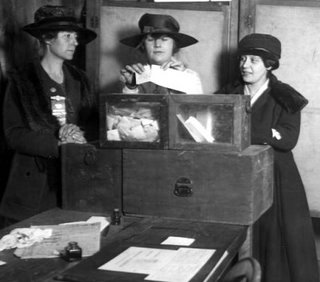 My picture shows women voting for the first time in New York in 1917. It took the 19th amendment in 1920 to deliver the vote nationwide; on our side of the Atlantic it took another eight years. [Wikipedia tells me, however, that the British owned Pitcairn Islands granted female suffrage as long ago as 1838]. According to Polly Toynbee the beneficiaries of that 1928 measure do not currently appear to include the Labour Party. See also similar article here.
My picture shows women voting for the first time in New York in 1917. It took the 19th amendment in 1920 to deliver the vote nationwide; on our side of the Atlantic it took another eight years. [Wikipedia tells me, however, that the British owned Pitcairn Islands granted female suffrage as long ago as 1838]. According to Polly Toynbee the beneficiaries of that 1928 measure do not currently appear to include the Labour Party. See also similar article here.For this reason she urges the election of a woman deputy leader to show women where their best interests lie. She points out that Conservatives have invariably reaped the female vote harvest- 'the right only ever won on the women's vote'. 1997 was the first time female votes helped Labour to win but in 2005 the female vote was equally split between Labour and Conservative. By this summer a Tory lead of 8 points had opened up. For some reason British women, unlike their counterparts in France, Germany and Italy, lean to the right and not the left.
Toynbee reflects on the things done by 'the most female friendly governement yet': maternity leave imnprovements and nurseries plus the fact that while in 1997 there were only child-care places for one in eight, today it's one in three. She also mentions Sure Start; the fact that it has been women who have benefitted most from the minimum wage. Then she lists tax credits, improvements in the NHS, more schools, and less crime. But still women have refused to view Labour as their government. Why? Polly thinks it's because of the Iraq war: 'women hate war and they hate it more than men do'. Poll evidence seems to back her up; she could be right if the US mid-terms are any indication.
She concludes by waving the flag for Harriet Harman, who is the only senior Labour figure who 'campaigns loudly and unashamedly on women's issues'. Polly points out that when Harman entered the House there were only 10 Labour MPs and now there are 97 yet, as Harman herself admits, Labour has somehow made them 'invisible'. She suggests Harriet would make a difference. My take on this is a bit cynical. Voters are very instrumental and have short memories; Labour gave them the economic stability they wanted but now they take it for granted and, according to polls, do not even allow Gordon any credit for achieving it. I suspect voters, even women voters, have accepted all that Labour has given them but that it now fails to register hardly at all. Indeed, I suspect that it weighs light in the balance compared with the winning, smiling, vacuously optimistic blandishments of the Tory toff. After all, it worked for Blair, so why not the same for Cameron?
Sunday, November 12, 2006
Brown Reforming Voting System Probably a Non- starter

I was intrigued by Jasper Gerard's suggestion today that Gordon Brown might make a dramatic move upon becoming prime minister to equal his granting independence to The Bank of England in 1997. How? By reforming the electoral system. I suggested on this blog many months ago that Blair might do the same in the short period left to him as a means of entrenching a Labour-Lib-Dem hegemony for decades to come. Now that would be a legacy worth leaving.
Gerard reports that Cameron seems to be very slow off the mark regarding pre-election feelers to Sir Ming's crowd- many of whom are more rightwards leaning these days, of course- in the event of a (likely) hung parliament in 2009. So the field is relatively open to Gordon suggests the Observer hack. Changing the system would require a referendum. Gerard says, however, that if the Lib Dems 'accepted a watered down version for now, retaining the link between MPs and their constituencies', then it could be passed off as 'tinkering and not constitutional change' and not require such problematic national consultation.
This last point seems very frail. What kind of 'watered-down' system does he envisage? OK, not STV but maybe the amended AMS of the Scottish and Welsh devolved assembly variety as suggested, in essence, by the late, revered Roy Jenkins in his ignored 1998 report? This scheme retains the constituency link but to introduce it nationwide would be vastly more than mere 'tinkering'. Moreover, would voters take yet another helping of Labour after Iraq and the cock-ups of Blair and co? And such a deal would need to be signalled well in advance to pre-empt any backlash and might not be deemed viable. No, Gordon would need to think this through very, very carefully. Despite Jasper's claim of 'half -decent' sources close to Brown, I suspect this highly political animal has already considered such an option and that he has no such idea- bold though it may seem- anywhere in mind.
Saturday, November 11, 2006
Bush Weakness Offers Opportunity to Blair
 That splendid blogger Paul Linford recently declared he was not going to comment on the US Mid-term elections, the reason being, as far as I could make out, that they offered little traction on what happened this side of the Atlantic. In my comment on his post I begged to differ in that I think there is a strong connection. The Guardian today supports this view by suggesting Bush's drubbing offers Blair the chance advance his view that talks should be opened up with those two demonised states, Syria and Iran. Our prime minister is due to give video linked evidence to the James Baker's bipartisan Iraq Study Group(ISG). He will, it is suggested, argue for accelerated 'Iraqi-isation' of the security forces, greater internal political cooperation within Iraq itself; and in addition a renewed push for progress in the Palestinian-Israeli conflict plus multilateral regional talks.
That splendid blogger Paul Linford recently declared he was not going to comment on the US Mid-term elections, the reason being, as far as I could make out, that they offered little traction on what happened this side of the Atlantic. In my comment on his post I begged to differ in that I think there is a strong connection. The Guardian today supports this view by suggesting Bush's drubbing offers Blair the chance advance his view that talks should be opened up with those two demonised states, Syria and Iran. Our prime minister is due to give video linked evidence to the James Baker's bipartisan Iraq Study Group(ISG). He will, it is suggested, argue for accelerated 'Iraqi-isation' of the security forces, greater internal political cooperation within Iraq itself; and in addition a renewed push for progress in the Palestinian-Israeli conflict plus multilateral regional talks. It is clear that the Democratic victory and the removal of Rumsfeld has produced a more fluid situation in which Bush is open to new policy directions (indeed he seemed to be inviting us, in one TV clip, to send him suggestions on a postcard). Martin Kettle suggests foreign policy has been virtually subcontracted to the ISG which is striving to find a way of withdrawing from Iraq with, failing honour, at least some dignity. On Global Warming too we are likely to see the Democrats forcing debates in Congress and some unfreezing of the White House suggestion that this is a smoke and mirrors argument created by Europeans keen to hobble the US economy. In other words there is a substantial dividend payable to us from these results. But, as someone wholly fascinated by US politics, I am just as interested in those probing powerful enquiries a Democratic Congress will now set in train.
I would suggest Nancy Pelosi looks no further for her starting point than the Guardianfilms award winning Iraq's Missing Billions made by Ali Fadhil. This film explores why nearly $20bn, earmarked for reconstruction in Iraq, just disappeared, almost certainly the result of corruption either in Iraq or at the US end. The film maker risked life and limb in making his film and this truly shocking misappropriation of money, allocated to improve the daily lives of Iraqis, deserves to be subjected to the light of an inquiry.
Thursday, November 09, 2006
Bush Faces Ozymandian Future
 So it seems Virginia Senator Allen's smears against challenger Jim Webb's historical novels failed to prevent George Bush's 'thumping' being elevated to a 'kicking' as he lost control today of the Senate as well as the House of Representatives which he lost yesterday. Now he faces an impotence over the next two years which the long overdue despatch of Donald Rumsfeld will not in any way prevent.
So it seems Virginia Senator Allen's smears against challenger Jim Webb's historical novels failed to prevent George Bush's 'thumping' being elevated to a 'kicking' as he lost control today of the Senate as well as the House of Representatives which he lost yesterday. Now he faces an impotence over the next two years which the long overdue despatch of Donald Rumsfeld will not in any way prevent.Shelley's poem, Ozymandias, on the arrogance and transience of power, includes the famous lines
'My name is Ozymandias, King of Kings,
Look on my works, ye Mighty, and despair!'
Well, in the poem, at least it took centuries for the 'king of kings' (thought to refer to Napoleon) to end up ruined and swallowed up by the desert sands. In the case of Bush the timescale has been only three years though the sands in his case have been not the presumed Sahara of the poem, but the sands of Iraq. Already:
The lone and level sands stretch far away
[Oh Boy, what a result!]
Wednesday, November 08, 2006
Is it Time for an Elected Head of State?

 Recently my son and I debated the utility of the monarchy. Unusually for a radical young man like him, he argued in favour of: the symbolism of the institution; the role it plays in giving us an identity grounded in our history; and the unsuitability of a putative elected retired politician as 'president'. All very Conservative sentiments, as I pointed out to him, but all worthy of debate too.
Recently my son and I debated the utility of the monarchy. Unusually for a radical young man like him, he argued in favour of: the symbolism of the institution; the role it plays in giving us an identity grounded in our history; and the unsuitability of a putative elected retired politician as 'president'. All very Conservative sentiments, as I pointed out to him, but all worthy of debate too.My feeling is that as long as a majority of us want to retain a monarchy then it should, naturally, continue. But should its usefulness be regularly judged negatively at sometime in the future, then I think it will be time to eschew atavistic sentimentality and embrace a new system unsullied by the associations of our generally undistinguished Royal Family. With the exception of the present Queen, who has fulfilled her duty with a devoted, though sometimes grim, sense of duty, the royals have been a pretty useless lot.
I have already posted recently on how 'Dickie' Mountbatten used his royal connections to command military and political positions damagingly way beyond his ability. My source for that post, Andrew Roberts', exceptional Churchillians, also details the die-hard appeasing sympathies of the royals not to mention their sometimes open flirtations with the enemy itself(see Chapter 1, The House of Windsor and the Politics of Appeasement).
The royals are determined defenders of the snobbish social order which is one of the most resistible things about our society; witness their absurd delight and determination in denying first the Duchess of Windsor and then Diana the initials, 'HRH'. They underpin an invidious social system based on the emblems of birth and privilege. Add to that the absurd insistence of Prince Charles that he be addressed as 'Sir' even by his friends at dinner parties. I would hate to be a 'subject' of a man like that- wouldn't you? I, for one, would be perfectly happy to allow an elected president to invite leader of the largest party after an election to form a government and to preside over sundry national days and events. Why-ever not?
Tuesday, November 07, 2006
ID Cards Likely to be a Dodgy Legacy for Blair
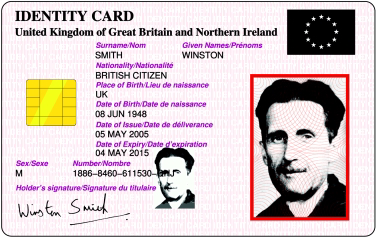 Michael White today wonders why Tony Blair is so gung ho for ID Cards when so much of the evidence seems unhelpful and even he, its greatest fan, sounds an unconvincing advocate. A report in the Sunday Times last July reported leaked Whitehall emails which predicted the scheme 'is set to fail and may not be introduced for a generation'. Blair assures us they will help foil terrorism, benefit fraud, health tourism, serious crime and illegal immigration and all at the cost of a mere £5.4bn. But against this can be adduced:
Michael White today wonders why Tony Blair is so gung ho for ID Cards when so much of the evidence seems unhelpful and even he, its greatest fan, sounds an unconvincing advocate. A report in the Sunday Times last July reported leaked Whitehall emails which predicted the scheme 'is set to fail and may not be introduced for a generation'. Blair assures us they will help foil terrorism, benefit fraud, health tourism, serious crime and illegal immigration and all at the cost of a mere £5.4bn. But against this can be adduced:i) the dangers of identity theft which White reckons has reduced the utility of similar schemes abroad. However clever we are the fraudsters are only a lap behind us and always seem swiftly to end up in front.
ii) the problems government have had with complex IT schemes have been notorious- £20bn lost on the NHS scheme no GPs wanted to use; the Criminal records cock-up; family tax credits; and the Child Support Agency. White cites the successes like vehicle licensing and online income tax but one has to wonder if there is a track record here on which taxpayers can rely when their billions are invested.
iii) Early in 2006 an LSE study produced an estimated cost for the project of £19-24bn, rather than the fraction of that sum the government claim it will cost.
iv) Simon Hoggart, in his sketch also raises, for laughs, the quite serious question of what happens when we lose our sodding card or it gets damaged. Won't it be an almighty nuisance and, probably hugely expensive to replace? Polls show 80% of us are in favour of the idea but baulk at the likely price.
I haven't mentioned the civil liberties argument yet. In June 2004 the Information Commissioner, Richard Thomas told the Home Affairs Committee that he was 'increasingly alarmed' by a plan for which he did not see 'sufficient rationale'. However Polly Toynbee argues, unusually for a Guardian columnist perhaps, that such opposition merely reflects 'the wish of the middle class to be victims too' and goes on to defend the 'benign state' against its opponents who on this issue come mainly from the 'anti state individualistic right'. She's right I'm sure, but actually, I would have thought there were just a few opponents of the scheme on the left as well....
Monday, November 06, 2006
Saddam Should be Executed by Iraq
 As a Guardian reading liberal sortof person my instinct in the case of Saddam's sentence is to quote Dostoyevsky's comment that the best index of civilisation in a country is how it treats its criminals and to agree with Geoffrey Roberston QC on Today this morning that 'you can't end a bloodbath with a bloodbath'. I'm also aware that principles should be applied universally and that, as an opponent of the death penalty I should, along with the Guardian, oppose it as morally retrograde.
As a Guardian reading liberal sortof person my instinct in the case of Saddam's sentence is to quote Dostoyevsky's comment that the best index of civilisation in a country is how it treats its criminals and to agree with Geoffrey Roberston QC on Today this morning that 'you can't end a bloodbath with a bloodbath'. I'm also aware that principles should be applied universally and that, as an opponent of the death penalty I should, along with the Guardian, oppose it as morally retrograde.However when principles collide one side has to give way, especially when pragmatism weighs in as well. I think that in the final analysis we should allow Saddam to be hanged. Why do I, after essaying this moral minefield, (very) reluctantly line up with The Sun and the Daily Telegraph?
1. We have to recognise that the death penalty is accepted as justice in Iraq and that to allow them to mete out their own justice we have to allow them to impose the penalties they think best. Otherwise the notion that they have their own sovereign government is rendered absurd. The Iraqis who suffered under Saddam will not be satisfied with anything less than his death as 'justice'.
2. As long as Saddam remains alive there will be a hope among his supporters that he will one day arise to lead them once again. My friend who was once an officer in the British army always maintained he should have been deliberately shot as soon as he was discovered for this very reason.
3. Iraq has to draw a line under the Saddam era and try to establish a new future. The best way to do that is for its author to be taken out of the situation completely.
Iraq has been a tragedy for at least the past two decades. It is not conceivable, given present circumstances, that it can emerge from its purgatory without at least this additional deadly consequence. Politics is often about taking the path of the least evil. In these conditions, I fear, executing Saddam is the least bad thing to do.
Saturday, November 04, 2006
Schadenfreude a Heady Brew for Bush Haters
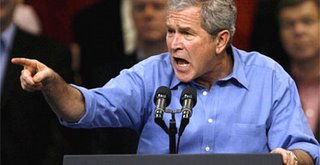
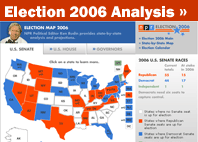 Schadenfreude is one of the most potent intoxicants in politics and, when I can, I enjoy bingeing on it; in 1997 I was positively drunk for months though that should have been salutory in how winning joy can merely be the prelude to disappointment and disillusion. Just in case Democrat sympathisers like me are throwing our baseball caps in the air prematurely, Martin Kettle reminds us that, even allowing for a victory on 7th November, the party of FDR and Kennedy-still stumbling for unity and coherence- has quite a lot to do if it is to have a chance of taking the White House in 2008. It is also the case that the Republicans, directed by its election Svengali, Karl Rove, might confound all the polls and deny the Democrats the sweeping victory they feel, in view of the Iraq debacle, they deserve.
Schadenfreude is one of the most potent intoxicants in politics and, when I can, I enjoy bingeing on it; in 1997 I was positively drunk for months though that should have been salutory in how winning joy can merely be the prelude to disappointment and disillusion. Just in case Democrat sympathisers like me are throwing our baseball caps in the air prematurely, Martin Kettle reminds us that, even allowing for a victory on 7th November, the party of FDR and Kennedy-still stumbling for unity and coherence- has quite a lot to do if it is to have a chance of taking the White House in 2008. It is also the case that the Republicans, directed by its election Svengali, Karl Rove, might confound all the polls and deny the Democrats the sweeping victory they feel, in view of the Iraq debacle, they deserve.But to reopen that bottle of schadenfreude, I was delighted to see two items in the paper today. First was the denouncing of Bush by those who had earlier urged the Iraq invasion on him. Richard Perle, that dark high priest of the neocons, has condemned the 'dysfunction' of Bush's administration and declared that for it we have to 'hold the president responsible.' And former defence Policy Board member Kenneth Adelman- remember the guy who predicted 'a cakewalk' in Iraq?- now regards the Bush 'national security team... as among the most incompetent in the postwar era.' Now they tell us.
Second was the delightful case of Ted Haggard, US president of the 30 million strong National Association of the Evangelicals. This father of five has been the high profile, White House insider leader of the campaign against gay marriage. It now seems that the male prostitute with whom he had enjoyed monthly drugs and sex sessions, was so disgusted by the pastor's hypocrisy that he rang up a local radio station to expose their three year relationship. It's hard to say what impact this will have on voters but, along with the 'gay predator' Mark Foley story it might just persuade a fair slice of Bush's army of religious right supporters to either refuse to be part of the Republican's efficient election-day machine or to not bother to vote at all.
We'll see where we are on the morning of 8th November but I'm keeping a bottle of the 'S' stuff handy by my bed, in case I can start on it early once James Naughtie reports on the US elections for the Today Programme.
Friday, November 03, 2006
Why Shouldn't we have a Vote in US Elections?
 My contact with Americans has mostly been very cordial. I find them friendly, warm, likeable and very eager to be liked. They must therefore find it galling that their president has been responsible for a pretty mega worldwide disillusion with the US of A. We learn from The Guardian today that in Mexico and Canada, over half of polled respondents thought George Bush's foreign policy has made the world less safe. In the UK, the figure is 69 per cent. When it comes to who poses the greatest danger to world peacewe place the Iranian president- who wants to wipe Israel off the face of the earth- at 62%, the dangerously eccentric Kim il Jong at 69% and Bush at 75%, 12 points behind Osama himself. But it gets worse.
My contact with Americans has mostly been very cordial. I find them friendly, warm, likeable and very eager to be liked. They must therefore find it galling that their president has been responsible for a pretty mega worldwide disillusion with the US of A. We learn from The Guardian today that in Mexico and Canada, over half of polled respondents thought George Bush's foreign policy has made the world less safe. In the UK, the figure is 69 per cent. When it comes to who poses the greatest danger to world peacewe place the Iranian president- who wants to wipe Israel off the face of the earth- at 62%, the dangerously eccentric Kim il Jong at 69% and Bush at 75%, 12 points behind Osama himself. But it gets worse.The mid-term elections threaten to knock a wheel or two off Dubya's wagon. If we are lucky they will. 15 extra seats won by the Democrats and he will have lost control over the House of Representatives; most pollsters in the US think this is more rather than less likely. To do the same for the Senate, Democrtas will need to win six more seats but these contests are less likely to elude the efforts of Bush's election-meister, Karl Rove, whom, we learn is quietly confident his well funded last minute barrage of (often vicious) attack ads combined with the formidable Republican capacity for getting out the vote on the day, will deny the Democrats their possible victory.
Few tears will be lost this side of the Atlantic if Bush is rendered a lame duck president by these elections, unable to push his laws through Congress and vulnerable to the sort of powerfully intrusive inquiry(for example into the origins of the Iraq War) which Congress (but not our parliament), is capable of making. The biggest issue of the elections is Iraq and the majority of Americans have now lost faith in the adventure and want US troops withdrawn as soon as possible. Bush's personal ratings have plummetted to record lows in recent months but such is the power of the incumbent in the US Congress that Bush might still avoid the fate he so richly deserves.
It sometimes strikes me- as I contemplate from 3000 miles away- the way the world's only superpower is governed, that those countries, like us, which are so deeply affected by the actions of the US President, should also have a vote in their elections. From one point of view it would be impeccably democratic and also, at minimum, prevent anyone as dangerously incompetent as Bush from ever being elected; however, we can only dream.
Thursday, November 02, 2006
Should I Worry More About Civil Liberties?
 Having read all the appropriate texts- 1984, Brave New World, The Gulag Archipelago, Hannah Arendt On Totalitarianism etc, I'm very aware of how unscrupulous governments can exploit information on citizens it may wish to manipulate, intimidate or even destroy. Yet somehow I can't get as indignant on the subject of eroding civil liberties as the likes of the estimable Henry Porter who blows this trumpet in The Observer or even Liberty's hugely impressive Shami Chakrabati.
Having read all the appropriate texts- 1984, Brave New World, The Gulag Archipelago, Hannah Arendt On Totalitarianism etc, I'm very aware of how unscrupulous governments can exploit information on citizens it may wish to manipulate, intimidate or even destroy. Yet somehow I can't get as indignant on the subject of eroding civil liberties as the likes of the estimable Henry Porter who blows this trumpet in The Observer or even Liberty's hugely impressive Shami Chakrabati.Reading the piece in The Guardian today about Spy Planes, Clothes Scanners and Secret Cameras: Britain's Surveillance Future, I wondered why this particular spectre did not arouse in me the sort of Guardian reader's angst which other subjects invariably manage. The answers are I think that:
i) I have not so far in my life suffered as a result of an oppressive government seeking to stifle my voice on anything of which I can think.
ii) I find it hard to believe- perhaps(no, make that a 'probably') naively-that our British government is ever going to become anything like the regimes of Stalin, Hitler or Kim Jong-il.
iii) I am a middle aged, very law abiding citizen regularly worried by the threats to safety and well-being posed by loutish behaviour and possible terrorist action to myself and millions like me. If we are being constantly surveyed by CCTV (or even spy planes for goodness sake), my reaction is, if it helps make us more secure: 'who cares?'
So that's my personal analysis of why I'm 'not (especially) bovvered' by such stories. And yet... why do I feel a bit guilty for not being so?
Wednesday, November 01, 2006
Legislative Timidity over Iraq Inquiry Shames Us
The Guardian today describes Adam Price the Plaid Cymru MP, who earlier tried to impeach Tony Blair over Iraq as someone who
‘has done more to put parliamentary pressure on the prime minister than over Iraq since 2003 than the entire shadow front bench.’
I posted on the debate which he and the SNP facilitated yesterday whilst it was taking place so could not provide the vote result which was a victory for the government by 25 seats, as opposed to the 67 vote majority which it in theory commands. As expected a number of anti-war MPs voted with the government out of dislike for the nationalists- seems the bigger parties can all unite in hating them- and indignation at the Conservatives’ political opportunism.
But like the Guardian leader linked above, I was sorry the vote was lost. Beckett’s plea that a vote in favour of an inquiry now would send the wrong message to our enemies and damage the morale of our lads in Basra, neglects the fact that inquiries took place into aspects of both world wars-when national interests were far more directly threatened- while combat was in progress without any adverse consequences. Indeed a dabate on one was instrumental in installing into power the man who went on to become the principal architect our our victory against Nazism. Moreover, if both the independent Hutton and Butler inquiries did the same thing, how much more reason for the body charged with holding the executive to account to act in this wholly appropriate fashion?
This point is amplified by Simon Jenkins in his passionate and angry piece today. He compares the presence in the UK of Vernon Jordan, a member of the US Congressional Iraq Study Group, chaired by James Baker and Lee Hamilton. Even though Congress is Republican controlled its Armed Services Committees interrogated a succession of officials including Paul Wolfowitz and Douglas Feith, with ‘mounting, albeit partisan savagery’. Generals returning from duty plus Condoleeza Rice and Donald Rumsfeld, were also given the treatment and, whilst this process did not change policy, it laid the grounds for the major change which seems currently to be taking place. Jenkins notes how supine our parliament has been by comparison with Congress with:
‘no indictment of the pre-invasion mendacity or the lack of post invasion planning. The Commons has not cross-examined returning generals or diplomats with anything but cringing deference.’
It was Sir Richard Dannatt, taking his career in his hands, who had to raise the question in public of whether the war was militarily or politically justified. Jenkins judges that of parliament’s tasks, independent legislation has long ceased, debates are worse attended than ‘a pub game of Trivial Pursuits’ and that regarding ‘scrutiny, Of that there is none.’
‘has done more to put parliamentary pressure on the prime minister than over Iraq since 2003 than the entire shadow front bench.’
I posted on the debate which he and the SNP facilitated yesterday whilst it was taking place so could not provide the vote result which was a victory for the government by 25 seats, as opposed to the 67 vote majority which it in theory commands. As expected a number of anti-war MPs voted with the government out of dislike for the nationalists- seems the bigger parties can all unite in hating them- and indignation at the Conservatives’ political opportunism.
But like the Guardian leader linked above, I was sorry the vote was lost. Beckett’s plea that a vote in favour of an inquiry now would send the wrong message to our enemies and damage the morale of our lads in Basra, neglects the fact that inquiries took place into aspects of both world wars-when national interests were far more directly threatened- while combat was in progress without any adverse consequences. Indeed a dabate on one was instrumental in installing into power the man who went on to become the principal architect our our victory against Nazism. Moreover, if both the independent Hutton and Butler inquiries did the same thing, how much more reason for the body charged with holding the executive to account to act in this wholly appropriate fashion?
This point is amplified by Simon Jenkins in his passionate and angry piece today. He compares the presence in the UK of Vernon Jordan, a member of the US Congressional Iraq Study Group, chaired by James Baker and Lee Hamilton. Even though Congress is Republican controlled its Armed Services Committees interrogated a succession of officials including Paul Wolfowitz and Douglas Feith, with ‘mounting, albeit partisan savagery’. Generals returning from duty plus Condoleeza Rice and Donald Rumsfeld, were also given the treatment and, whilst this process did not change policy, it laid the grounds for the major change which seems currently to be taking place. Jenkins notes how supine our parliament has been by comparison with Congress with:
‘no indictment of the pre-invasion mendacity or the lack of post invasion planning. The Commons has not cross-examined returning generals or diplomats with anything but cringing deference.’
It was Sir Richard Dannatt, taking his career in his hands, who had to raise the question in public of whether the war was militarily or politically justified. Jenkins judges that of parliament’s tasks, independent legislation has long ceased, debates are worse attended than ‘a pub game of Trivial Pursuits’ and that regarding ‘scrutiny, Of that there is none.’



